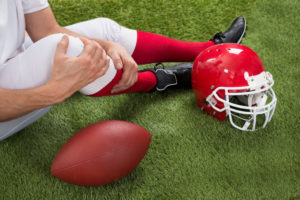
A survey conducted by the Journal of Child & Adolescent Substance Abuse found that high school athletes are some of the most at-risk for getting addicted to prescription pain medication.
It starts innocently enough – a student athlete sustains an injury and is prescribed some form of pain medication, such as hydrocodone or OxyContin, to help them manage pain while they heal. Some athletes do not allow themselves adequate time to heal, and will jump back into the playing field despite the pain, which can cause a dependence on pain medication to help them manage.
Opioids work by interacting with opioid receptors in the brain, which creates a high, and can lead to addiction. Because of its interference with the chemistry of the brain, it can be especially dangerous for a younger person, whose brain might not be fully developed.
Parents – it is extremely important to talk with your child about the dangers of opioids. It can also be helpful to know the signs that your child might be struggling with opioid addiction.
Here are a few:
- Unexplained mood and personality changes
- Changes in relationships with family or friends
- Becoming more withdrawn and/or depressed
- Avoiding family or school functions, as well as activities that were once important to them
- Poor concentration
- Hostility
- Changes in eating, sleeping or grooming habits
If your student is taking pain medication, there are several steps you can take:
- Discuss the effects of opioids and why they are dangerous.
- Make sure to frequently count the pills to make sure they are being taken properly. Lock up medication and store it in a secure place. Drop off unused/expired medication for proper disposal.
If you feel like your teen might be struggling with addiction, there are several national and local resources for parents. Visit our resources page for more information.

Leave a Reply